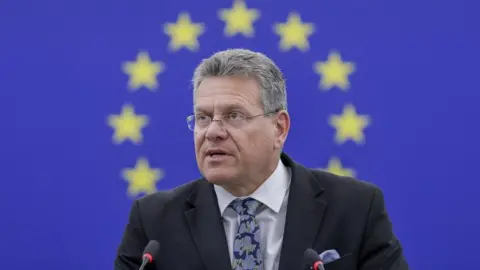In a significant turn of events in transatlantic trade relations, European Union Trade Commissioner Maroš Šefčovič recently addressed U.S. President Donald Trump’s announcement of an intended 50% tariff on all EU goods entering the United States. The Commissioner emphasized the necessity for trade between the EU and the U.S. to be guided by respect rather than threats, asserting that both sides must work collaboratively towards a mutually beneficial agreement.
This call for civility and cooperation came right after Trump expressed discontent with the slow progress of negotiations between the two parties. The U.S. President took to social media to publicly announce his plans to increase tariffs starting June 1, stating that discussions with the EU had not been fruitful. “Our discussions with [the EU] are going nowhere,” Trump remarked, reinforcing his assertive stance by clarifying that his focus was not on seeking a deal but rather on the pre-established agreements he deemed satisfactory.
The stakes in these negotiations are high, as the EU stands as one of the largest trading partners for the United States. Last year alone, the EU exported over $600 billion worth of goods to the U.S. while importing approximately $370 billion, evidencing a significant trade interdependence. The potential introduction of a 50% tariff would send shockwaves through this delicate economic web, impacting businesses, consumers, and overall economic stability on both sides.
Šefčovič’s comments underscored the EU’s readiness to defend its economic interests, highlighting the bloc’s engagement in pursuing a practical deal that serves the needs of both parties. His remarks followed his discussions with notable U.S. officials, including Trade Representative Jamieson Greer and Commerce Secretary Howard Lutnick, emphasizing a resolve for constructive negotiation. The EU’s commitment stands firm, despite the U.S. administration’s aggressive posture that threatens to dismantle decades of cooperative trade practices.
European leaders echoed Šefčovič’s sentiments, recognizing that escalating tariffs could have detrimental effects on both economies. Irish Taoiseach Micheál Martin articulated the perspective of many EU officials, voicing that “we do not need to go down this road,” and asserted that negotiations represent the only sustainable path forward. Similarly, French Foreign Minister Laurent Saint-Martin advocated for de-escalation while leaving open the possibility for responses if necessary.
Notably, the situation is under constant scrutiny, with conversations revolving around Trump’s broader ambitions in reshaping the global economic landscape. Strategic alliances are becoming more fragmented as discussions suggest potential negotiations may shift to individual European countries rather than the EU acting as a unit, a possibility posited by Stephen Moore, a former economic advisor to Trump.
The proposed tariffs and ongoing negotiations have ramifications far beyond just trade figures. They challenge the harmony built between the EU and the U.S., where interdependence has framed the long-term economic narrative. Observing past trends, tariffs have fluctuated during negotiations, often leading to downward spirals in economic performance. As indicated, the U.S. tariffs on EU steel and aluminum imports remain in effect, symbolizing the continued tension within these relations.
In the financial markets, the uncertainties generated by Trump’s tariff threats have already begun to ripple through the economy, evidenced by declines in major stock indices in both the U.S. and Europe. With the S&P 500 down by approximately 0.7% and European indexes like Germany’s DAX and France’s CAC 40 decreasing by more than 1.5%, the broader economic implications of trade disputes are becoming vividly clear to stakeholders worldwide.
In conclusion, the evolving situation indicates a potential threshold for transatlantic relations amid trade disagreements and tariff threats. While both sides express a desire for negotiations, the continuation of a respectful and collaborative approach remains imperative in averting deeper conflicts that could spiral into significant economic confrontations. The coming weeks will be pivotal as the actions taken by either side will define the trajectory of U.S.-EU trade dynamics and their subsequent global footprint.



